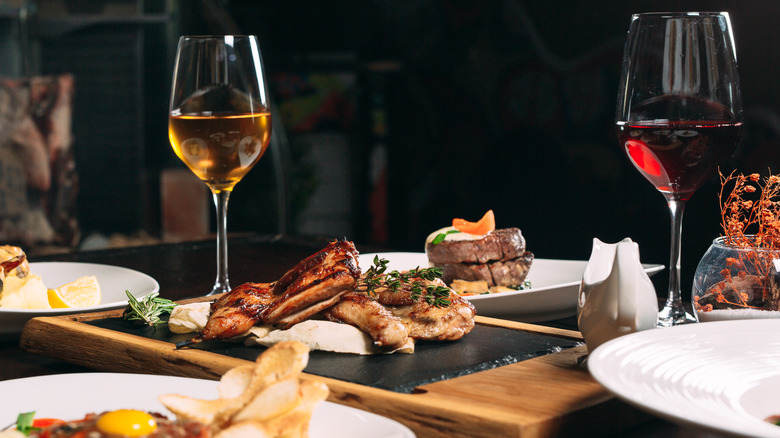Here's What It Takes To Become An Inspector For The Michelin Guide
Have you ever dreamed of traveling the world and visiting upscale restaurants? Do you have a passion for food and an eye for quality? Becoming a Michelin Guide inspector might just be the perfect career for you. Think of it as an opportunity to do what you love and shape the culinary landscape.
Being a Michelin inspector is as glamorous as it seems, but not everyone can do this job. As of today, only 120 people worldwide hold this coveted position, notes the Ottimmo International MasterGourmet Academy. These elite food critics travel tens of thousands of miles annually, scouring the globe for the best restaurants and hotels.
"An inspector will eat upwards of nine meals a week — lunches and dinners. If you multiply that, it could be 275 to 300 meals a year," said one of these professionals in a 2019 interview with TimeOut Chicago. He added, "I like to think of myself more as James Bond than a grumpy old food critic." So, yes, the rumors are true: Maintaining a low profile is part of the job. Moreover, aspiring inspectors undergo extensive training and must have specific skills.
The secret life of Michelin Guide inspectors
First, make sure you know what to expect in this role. We've all seen movies and TV shows about talented chefs trying to get a Michelin star, but things are a little bit different in real life. Michelin Guide inspectors do more than just sample foods, take notes, and make the call. Plus, their decision isn't based solely on how they feel about a place.
Michelin inspectors evaluate a restaurant based on five criteria, such as the quality of the ingredients used. Additionally, they must remain anonymous at all times and pay for their meals out of pocket. These food critics cannot be affiliated with any organization and must have several years of work experience in the hospitality sector, explains the Michelin Guide.
In this role, you are expected to visit a restaurant several times throughout the year before awarding a Michelin star. Sometimes, a restaurant needs to be evaluated by two or more food critics. "The star selections are validated through a 'collegial' process: a diverse group of inspectors from multiple global regions is responsible for confirming the stars awarded in every edition," according to an anonymous Michelin inspector (via Forbes). The inspector added that hiding his identity is one of the most challenging aspects of the job.
What are the requirements for becoming a Michelin inspector?
Working as a Michelin Guide inspector has its perks, but it's not for everyone. Candidates must be ready and willing to travel, which can be difficult for those with families. According to the Michelin Guide, the average restaurant inspector is expected to spend about three weeks on the road every month. Applicants must also have at least five years of relevant work experience and in-depth knowledge of the culinary arts.
"The ideal candidate is preferably a chef, but we also have some managers, some people that have focused on wine," Rebecca Burr, a former Michelin inspector, said to CNN Travel in 2017. "We need an appreciation of what it takes to run a restaurant," she added. Moreover, those who pursue this path should feel comfortable dining alone and visiting multiple restaurants on the same day, which can be mentally and physically draining. Plus, they cannot interact directly with the chefs.
Chris Watson, a former Michelin inspector, told Set the Tables that those who are new to the job must accompany other inspectors during their first nine to 12 months of work to gain experience. Later, they are assigned specific regions in which they will evaluate restaurants, hotels, and new dining establishments. Apart from that, they have to do admin work, such as filling out reports.
Is this career path right for you?
The Michelin Guide doesn't explicitly require inspectors to attend culinary school, but you're expected to have a good understanding of culinary techniques, food ingredients, and global cuisines. Therefore, it's in your best interest to take the best cooking classes or study to become a chef. Any of these options require time and money, and you may not be able to complete training if you're a full-time employee or juggling multiple jobs.
Also, this career path isn't suitable for vegans, vegetarians, or those on special diets. "You must eat everything — every cuisine, every part of the animal," former Michelin inspector Chris Watson said to Set the Tables. Plus, you must be able to assess the ambiance, service, menu, and other aspects of running a dining venue objectively. The job isn't all about food. Watson also told Luxeat in 2021 that most meals are average, and, sometimes, you might end up having dinner twice a day.
Working as a Michelin Guide inspector can be a dream job, but it may or may not fit your lifestyle. But if you have a background in culinary arts or hospitality and an eye for detail, you may want to give it a try. First, consider your schedule, food preferences, and career goals, among other aspects. "You don't get rich when you are a Michelin inspector; obviously, it's about quality of life and the experience," Watson said to Luxeat.



